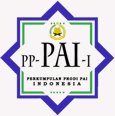PENDEKATAN HUMANISTIK DALAM PENGEMBANGAN KURIKULUM PENDIDIKAN AGAMA ISLAM
Abstract
Curriculum is a tool to achieve educational goals as well as guidance in the implementation of teaching in all types and levels of education. The development (developers) have discovered several approaches in curriculum development that is intended approach with how the strategy and the correct method by following these steps systematic development in order to obtain a better curriculum. One approach developed by the developer is a humanistic approach. Humanistic curriculum developed by education experts humanistic. The curriculum is based on the concept of the flow of private education (personalized education). This stream is more giving to the students the main venue. They proceed from the assumption that a child or student is first and foremost in education. He is a subject that became the center of education. They believe that students have potential, have the ability and strength to thrive. Humanistic education is expected to restore the role and function of man is to restore man to his nature as the best of creatures (khairu ummah). The purpose of emphasizing the humanistic curriculum in terms of personal development, integration and autonomy of the individual. This objective can be seen as a means of asserting themselves.
Keywords
Full Text:
PDFDOI: http://dx.doi.org/10.24014/potensia.v3i1.3477
Refbacks
- There are currently no refbacks.
Copyright (c) 2017 POTENSIA: Jurnal Kependidikan Islam

Potensia: Jurnal Kependidikan Islam
E-ISSN: 2442-5605
Published By:
Fakultas Tarbiyah dan Keguruan Universitas Islam Negeri Sultan Syarif Kasim Riau, Indonesia
Mailing Address:
Jl. H.R Soebrantas Km. 15 No. 155 Kelurahan Simpang Baru Kecamatan Tuah Madani, Pekanbaru, Riau, Indonesia
email: potensia.ftk@uin-suska.ac.id
Indexed By:
POTENSIA: Jurnal Kependidikan Islam is licensed under a Creative Commons Attribution 4.0 International License.

_-_Copyy2_(1)_copy1.jpg)

 TRANSLATE with
TRANSLATE with 


.jpg)
.png)
.jpg)
.jpg)




